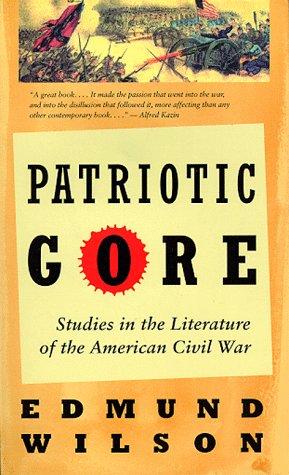 Reviewed: Patriotic Gore: Studies in the Literature of the American Civil War by Edmund Wilson (Norton, 848 pp., $37.95). Fifty years after its publication, it’s still easy to understand why Edmund Wilson’s Patriotic Gore got people all hot and bothered. Wilson devoted about 800 pages to “the literature of the American Civil War,” and at first blush, it seemed to be yet another of the many grand monuments erected in time to mark the war’s centennial celebration, which was in its second year by 1962.
Reviewed: Patriotic Gore: Studies in the Literature of the American Civil War by Edmund Wilson (Norton, 848 pp., $37.95). Fifty years after its publication, it’s still easy to understand why Edmund Wilson’s Patriotic Gore got people all hot and bothered. Wilson devoted about 800 pages to “the literature of the American Civil War,” and at first blush, it seemed to be yet another of the many grand monuments erected in time to mark the war’s centennial celebration, which was in its second year by 1962.
But America’s most eminent man of letters at the time (and arguably its greatest to this day) had an agenda that makes itself apparent right away. “Having lived myself through a couple of world wars and having read a certain amount of history,” he writes in his introduction, “I am no longer disposed to take very seriously the profession of ‘war aims’ that nations make.” So much, then, for any notions of a Northern “Noble Cause” or even a Southern “Lost Cause,” right? (Well, maybe, in the latter case, a little more so…)
Wilson’s opposition to America’s investment in the Cold War had reached the point in the early 1960s where he wasn’t helping to pay for it. (He published The Cold War and the Income Tax a year after Gore.) And so he applied the critical and historical acumen he’d previously brought to Marxism and modernism to writers on opposite sides of 19th-century America’s most shattering and indelible calamity to show how even this war wasn’t worth fighting.
Many call Patriotic Gore Wilson’s masterpiece. Much as I’d like to agree, my qualms began as soon as I peeked at its index and found no mention whatsoever of Frederick Douglass, Sojourner Truth, William Wells Brown, Nat Turner, or any other slave or ex-slave making a written testimony of their lives in bondage. Their absence is made even more conspicuous by the inclusion of many white Southern apologists, including Mary Chesnut, the “inconsecutive and repetitious, often self-contradictory” George Fitzhugh, and George Washington Harris, the Tennessee journalist who created the “malignant…cracker” character Sut Lovingood. (I would have settled for Joel Chandler Harris, Uncle Remus’s creator. They’re not here either.)
But then, having slaves’ voices woven into Patriotic Gore’s chronicle likely would have spoiled Wilson’s major point: that the war was less about slavery and racism than an imperial North imposing its will upon the South “not by reason of the righteousness of its cause but on account of the superior equipment which it was able to mobilize and its superior capacity for organization.” Wilson’s consideration to Southern grievances toward federal intervention before, during, and after the war is acute enough to make one wonder what he would have made of today’s variegated antagonisms by right-wing reactionaries toward any manner of federal law. Or, for that matter, the view of a new generation of African-American historians and activists that the participation of black soldiers in the Civil War was an unavoidable beginning of their own struggle for individual rights.
Because I believe that the charge of racism is too weighty to be applied with anything less precise than a scalpel, I prefer to think of Wilson’s avoidance of African-American concerns in Gore as being at worst willfully myopic. Besides, in its parts more than its whole, the book probes deeply at the people and issues it brings to light.
Wilson could find enough marrow in even the most obscure texts to create vivid social histories and character studies—of not just the most dominant figures (Lincoln, Grant, Sherman, Lee, Harriet Beecher Stowe) but also such lesser-known personalities as Alexander H. Stephens, the Confederacy’s vice president, who toward the end of the war secretly met with Lincoln in search of a compromise.
The journal of the book’s only African-American writer of note, Charlotte Forten, a daughter of Philadelphia’s black aristocracy, chronicles time she spent among the freedmen in the South. You could take issue with Patriotic Gore’s thematic intentions, especially a half-century later. But just because it’s not a masterwork doesn’t mean it’s not a classic.
Gene Seymour writes about culture for publications including The Nation and The New York Times.






0 Comments